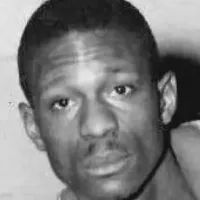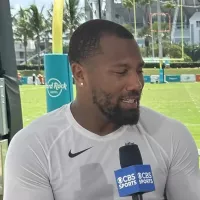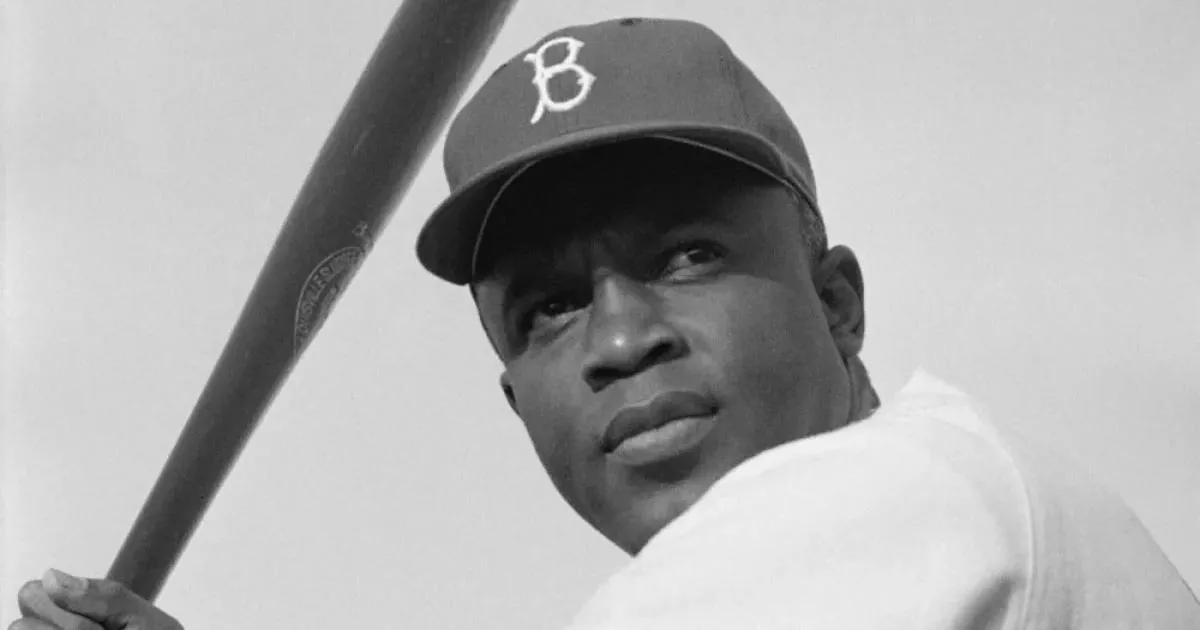Jackie Robinson was a pivotal figure in American history. As the first African American to play Major League Baseball in the modern era, he broke the color barrier in 1947, joining the Brooklyn Dodgers. This event marked a significant step towards desegregation in professional sports, ending the long-standing practice of relegating Black players to the Negro leagues. Robinson's courage and skill paved the way for future generations of African American athletes and contributed to the broader Civil Rights Movement.
January 31, 1919: Jack Roosevelt Robinson Born
On January 31, 1919, Jack Roosevelt Robinson was born in Cairo, Georgia. He would later become the first African American to play in Major League Baseball in the modern era.
1920: Family Move to Pasadena
In 1920, after Jackie Robinson's father left the family, they moved to Pasadena, California.
1922: Rachel Isum's Birth
In 1922, Rachel Isum, Jackie Robinson's future wife, was born. They met while he was a senior at UCLA and she was a freshman.
1935: Graduation from Junior High School
In 1935, Jackie Robinson graduated from Washington Junior High School and enrolled at John Muir Technical High School.
1936: Tennis and Baseball Achievements
In 1936, Jackie Robinson won the junior boys singles championship in the annual Pacific Coast Negro Tennis Tournament and earned a place on the Pomona annual baseball tournament all-star team.
1936: Inspiration to pursue sports
In 1936, Jackie Robinson's older brothers, Frank and Mack, inspired him to pursue his interest in sports. Mack was an accomplished track and field athlete who won a silver medal at the Berlin 1936 Summer Olympics.
January 25, 1938: Arrest for Disputing Detention
On January 25, 1938, Jackie Robinson was arrested after vocally disputing the detention of a black friend by police, leading to a suspended sentence and a reputation for combativeness against racial antagonism.
May 7, 1938: Broad-Jump Record
On May 7, 1938, Jackie Robinson broke an American junior college broad-jump record with a jump of 25 ft 6+1⁄2 in.
1939: Enrollment at UCLA
After graduating from Pasadena Junior College in the spring, Jackie Robinson enrolled at UCLA in 1939.
1939: UCLA Football Team
In 1939, Jackie Robinson was one of four black players on the UCLA Bruins football team, which was considered college football's most integrated team at the time.
1940: NCAA Championship
In 1940, Jackie Robinson won the NCAA championship in the long jump.
1940: UCLA football season
In the 1940 season, Jackie Robinson led the NCAA in punt return average while playing for UCLA.
1940: Left College
In the spring of 1940, Jackie Robinson left college just shy of graduation to work for the National Youth Administration.
July 1941: Initial OCS Guidelines
In July 1941, the Army's initial guidelines for Officer Candidate School (OCS) were drafted as race-neutral, but few black applicants were admitted until later directives.
December 1941: Return to California
In December 1941, Jackie Robinson returned to California after a short football season with the Honolulu Bears, planning to pursue a career with the Los Angeles Bulldogs, but the attack on Pearl Harbor ended his football career.
1942: Drafted into the Army
In 1942, Jackie Robinson was drafted into the Army and assigned to a segregated cavalry unit at Fort Riley, Kansas.
January 1943: Commissioned as Second Lieutenant
In January 1943, Jackie Robinson was commissioned as a second lieutenant after finishing Officer Candidate School (OCS). Shortly afterward, Robinson and Isum were formally engaged.
July 6, 1944: Bus Incident and Confrontation
On July 6, 1944, Jackie Robinson was taken into custody after refusing to move to the back of an Army bus when ordered by the driver. This led to a confrontation with a duty officer, who recommended Robinson be court-martialed.
August 1944: Acquittal
In August 1944, Jackie Robinson was acquitted by an all-white panel of nine officers after being court-martialed on charges of insubordination.
November 1944: Honorable Discharge
In November 1944, Jackie Robinson received an honorable discharge from the army and was encouraged to write to the Kansas City Monarchs for a tryout.
1944: Athletic Director at Samuel Huston College
In 1944, Jackie Robinson became the athletic director and basketball coach at Samuel Huston College in Austin after being discharged from the army.
August 28, 1945: Rickey interviews Robinson
On August 28, 1945, Branch Rickey interviewed Jackie Robinson for a possible assignment to the Brooklyn Dodgers' farm club, the Montreal Royals. Rickey questioned Robinson extensively about his ability to withstand racial abuse without reacting angrily, seeking a player "with guts enough not to fight back."
November 1, 1945: Rickey's Commitment
Before November 1, 1945, Branch Rickey committed to formally signing Jackie Robinson, although he required Robinson to keep the arrangement a secret for the time being.
1945: Played for the Kansas City Monarchs
In early 1945, Jackie Robinson accepted a contract to play professional baseball with the Kansas City Monarchs in the Negro leagues.
February 10, 1946: Robinson and Isum get married
On February 10, 1946, Jackie Robinson and Isum were married by their old friend, the Rev. Karl Downs.
March 17, 1946: Robinson makes Royals Debut
On March 17, 1946, Jackie Robinson made his debut for the Montreal Royals at Daytona Beach's City Island Ballpark in an exhibition game against the Brooklyn Dodgers, becoming the first black player to openly play for a minor league team against a major league team since the 1880s.
April 18, 1946: Robinson's Professional Debut
On April 18, 1946, Jackie Robinson made his professional debut with the Montreal Royals against the Jersey City Giants at Roosevelt Stadium. He had four hits in five at bats, including a three-run home run, and stole two bases in the Royals' 14–1 victory.
1946: Jackie Robinson Jr. Born
In 1946, Jackie Robinson Jr., Jackie Robinson's eldest son, was born.
1946: Robinson arrives at Daytona Beach
In 1946, Jackie Robinson arrived at Daytona Beach, Florida, for spring training with the Montreal Royals of the Class AAA International League.
1946: Robinson Plays for Montreal Royals
In 1946, Jackie Robinson played for the Montreal Royals, residing at 8232 avenue de Gaspé near Jarry Park.
1946: Robinson assigned to the Royals
In 1946, Jackie Robinson was assigned to the Montreal Royals, becoming the first black baseball player in the International League since the 1880s.
April 11, 1947: Robinson's Preseason Debut
On April 11, 1947, Jackie Robinson made his debut as a Dodger in a preseason exhibition game against the New York Yankees at Ebbets Field.
April 15, 1947: Jackie Robinson Breaks the Color Barrier
On April 15, 1947, Jackie Robinson broke the color line in professional baseball by starting at first base for the Brooklyn Dodgers, marking the end of racial segregation in professional baseball.
April 22, 1947: Racial Abuse from Phillies
On April 22, 1947, during a game against the Philadelphia Phillies, Phillies players and manager Ben Chapman directed racial slurs at Jackie Robinson from their dugout.
July 5, 1947: Doby breaks the color barrier in the American League
On July 5, 1947, Larry Doby broke the color barrier in the American League, just 11 weeks after Jackie Robinson.
1947: End of Rookie Season
At the end of his rookie season in 1947, Jackie Robinson brought home a jersey.
1947: Balanced Offensive Strategies
From 1947 to 1953 Jackie Robinson's career is generally considered to mark the beginning of the post–"long ball" era in baseball, in which a reliance on raw power-hitting gave way to balanced offensive strategies that used footspeed to create runs through aggressive baserunning.
1947: Robinson plays in the World Series
In 1947, Jackie Robinson became the first black player to play in the World Series as the Brooklyn Dodgers faced the Yankees. He appeared in all seven games, with the Dodgers ultimately losing in Game 7.
1947: Support from Players
In 1947, Jackie Robinson received encouragement from several major league players, including Lee "Jeep" Handley and Hank Greenberg, who had also faced prejudice. Larry Doby also spoke to Robinson throughout the season.
1947: Began Playing for the Brooklyn Dodgers
In 1947, Jackie Robinson started his major league career at age 28, playing for the Brooklyn Dodgers.
1947: Rookie of the Year Award
In 1947, Jackie Robinson won the Major League Rookie of the Year Award.
1947: Threat of Strike
In 1947, the St. Louis Cardinals allegedly threatened to strike if Jackie Robinson played, but National League President Ford Frick and Baseball Commissioner Happy Chandler made it clear that any striking players would be suspended.
February 1948: Robinson signs contract with the Dodgers
In February 1948, Jackie Robinson signed a $12,500 contract with the Dodgers.
March 1948: Robinson takes over second base
In March 1948, following Eddie Stanky's trade to the Boston Braves, Jackie Robinson took over second base for the Dodgers.
August 1948: Dodgers briefly move into first place
In late August 1948, the Dodgers briefly moved into first place in the National League.
August 29, 1948: Robinson hits for the cycle
On August 29, 1948, in a game against the St. Louis Cardinals, Jackie Robinson hit for the cycle—a home run, a triple, a double, and a single in the same game.
1948: Batting Average of .296
In 1948, Jackie Robinson had a batting average of .296 before seeking help from George Sisler.
1948: Reese shows support for Robinson
In 1948, Pee Wee Reese showed his support for Jackie Robinson by putting his arm around him in response to racial slurs from fans before a game in either Boston or Cincinnati.
1948: Desegregation of the Military
In 1948, President Harry Truman desegregated the military, which led the country toward increased equality for blacks. Robinson's success symbolized these broader changes.
1949: Rookie of the Year Award
Due to his performance in the 1947 season, Jackie Robinson earned the inaugural Major League Baseball Rookie of the Year Award in 1949.
1949: National League Most Valuable Player Award
In 1949, Jackie Robinson won the National League Most Valuable Player Award, becoming the first Black player to be so honored.
1949: Named Most Valuable Player for the National League
In 1949, Jackie Robinson's batting average improved to .342 after working with George Sisler. He stole 37 bases, was second in the league for doubles and triples, registered 124 runs batted in and 122 runs, earning him the Most Valuable Player Award for the National League. Baseball fans also voted Robinson as the starting second baseman for the 1949 All-Star Game, the first to include black players.
1949: Song about Robinson Reaches Number 13 on Charts
In 1949, the song "Did You See Jackie Robinson Hit That Ball?" by Buddy Johnson reached number 13 on the charts, and Count Basie recorded a famous version. The Dodgers won the National League pennant but lost the 1949 World Series to the New York Yankees.
1949: Testimony Before the House Committee on Un-American Activities
In July 1949, Jackie Robinson was called to testify before the United States House of Representatives' Committee on Un-American Activities (HUAC) concerning statements made by Paul Robeson. Robinson reluctantly agreed, fearing negative consequences for his career.
1950: Highest Salary and Film Biography
In 1950, Jackie Robinson led the National League in double plays made by a second baseman with 133 and had the highest salary any Dodger had been paid to that point: $35,000. The film biography of Robinson's life, The Jackie Robinson Story, was released in 1950, in which Robinson played himself, and Ruby Dee played Rachel "Rae" (Isum) Robinson.
1950: League Leader in Fielding
In 1950, Jackie Robinson led the league in fielding among second basemen.
1950: Portrayed Himself in Film
In 1950, Jackie Robinson portrayed himself in the motion picture The Jackie Robinson Story.
1950: Sharon Robinson Born
In 1950, Sharon Robinson, Jackie Robinson's daughter, was born.
1950: Rickey's Departure from the Dodgers
In late 1950, Branch Rickey's contract as the Dodgers' team President expired. Rickey, weary of disagreements with Walter O'Malley, cashed out his financial interest in the team and became general manager of the Pittsburgh Pirates. Robinson expressed his appreciation in a letter to Rickey.
October 3, 1951: Dodgers Lost Pennant
On October 3, 1951, the Dodgers lost the pennant on Bobby Thomson's home run, known as the Shot Heard 'Round the World. Robinson ensured Thomson touched all bases. He finished the season with 106 runs scored, a batting average of .335, and 25 stolen bases.
1951: Led National League in Double Plays
During the 1951 season, Jackie Robinson led the National League in double plays made by a second baseman for the second year in a row, with 137. During the last game of the regular season, in the 13th inning, he had a hit to tie the game and then hit a home run in the 14th inning, which proved to be the winning margin.
1951: Led League in Fielding
In 1951, Jackie Robinson led the league in fielding among second basemen.
1951: Offered Manager Job for the Montreal Royals
Reportedly, before the 1951 season, Walter O'Malley offered Jackie Robinson the job of manager of the Montreal Royals at the end of Robinson's playing career.
1952: David Robinson Born
In 1952, David Robinson, Jackie Robinson's youngest son, was born.
1952: Career High On-Base Percentage
In 1952, Jackie Robinson had 104 runs, a .308 batting average, and 24 stolen bases. He recorded a career-high on-base percentage of .436. The Dodgers won the National League pennant before losing the 1952 World Series. On the television show Youth Wants to Know, Robinson challenged the Yankees' general manager, George Weiss, on the racial record of his team. The 1952 season was the last year Robinson was an everyday starter at second base.
1953: More Than 110 Runs
From 1947 to 1953 Jackie Robinson's career averaged more than 110 runs.
1953: Death Threats and Racial Advocacy
In 1953, Jackie Robinson had 109 runs, a .329 batting average, and 17 steals. The Dodgers led to another National League pennant but lost to the Yankees in the World Series. He served as editor for Our Sports magazine and addressed racial issues publicly, criticizing segregated hotels and restaurants, leading to some establishments integrating.
1954: All-Star Season
1954 was the last of six consecutive seasons from 1949 Jackie Robinson was an All-Star.
1954: Home Runs and Doubles
In 1954, Jackie Robinson had 62 runs scored, a .311 batting average, and 7 steals. On June 17, 1954, he hit two home runs and two doubles.
1955: World Series Championship
In 1955, Jackie Robinson contributed to the Dodgers' World Series championship.
1955: Dodgers Win World Series
In the autumn of 1955, Jackie Robinson won his only championship when the Dodgers defeated the New York Yankees in the World Series. In 1955, he hit .256 and stole only 12 bases. The season was the worst year of Robinson's individual career. Don Newcombe became the first black major league pitcher to win twenty games in a year.
December 1956: NAACP Spingarn Medal
In December 1956, the NAACP recognized Jackie Robinson with the Spingarn Medal, awarded annually for the highest achievement by an African-American.
1956: Final Season and Retirement Agreement
In 1956, Jackie Robinson had 61 runs scored, a .275 batting average, and 12 steals. He exhibited effects of diabetes and lost interest in professional baseball. Robinson ended his major league career when he struck out to end Game 7 of the 1956 World Series. The Dodgers traded him to the New York Giants, but he had already agreed to become an executive with Chock full o'Nuts and retire, revealing his decision through Look magazine.
1956: Final Season
Jackie Robinson's final season playing for the Brooklyn Dodgers was in 1956.
January 5, 1957: Retired From Baseball
Jackie Robinson retired from baseball at age 37 on January 5, 1957.
1957: VP for Personnel at Chock full o'Nuts & NAACP Freedom Fund Drive Chair
In 1957, Jackie Robinson became the vice president for personnel at Chock full o'Nuts, making him the first Black American to serve as vice president of a major American corporation. He also chaired the NAACP's million-dollar Freedom Fund Drive.
July 1959: Boston Red Sox Integrated Roster
In July 1959, more than 14 years after a tryout that subjected Jackie Robinson to racial epithets, the Boston Red Sox became the final major league team to integrate its roster.
October 1959: Robinson Protests Segregation at Greenville Airport
In October 1959, Jackie Robinson protested racial segregation by entering the whites-only waiting room at Greenville Municipal Airport. When asked to leave by airport police, Robinson refused and in a speech in Greenville, South Carolina, he urged black citizens to vote and protest their second-class citizenship.
1960: Robinson Supports Nixon
In 1960, Jackie Robinson supported Richard Nixon in his presidential race against John F. Kennedy.
1962: Elected to Baseball Hall of Fame
In 1962, Jackie Robinson was elected to the Baseball Hall of Fame in his first year of eligibility. He was the first Black American player inducted into the Cooperstown museum. He encouraged voters to consider only his on-field qualifications.
1964: Freedom National Bank Founder
In 1964, Jackie Robinson helped found Freedom National Bank, a Black-owned and operated commercial bank based in Harlem, with Harlem businessman Dunbar McLaurin. He also served as the bank's first chairman of the board.
1964: Robinson Angered by Goldwater's Candidacy
In 1964, Jackie Robinson was angered by the presidential election candidacy of conservative Republican Senator Barry Goldwater, who had opposed the Civil Rights Act of 1964.
1965: Joins ABC's Major League Baseball Game of the Week
In 1965, Jackie Robinson became an analyst for ABC's Major League Baseball Game of the Week telecasts, making him the first Black American to hold such a position.
1966: Robinson Becomes Special Assistant for Community Affairs
In 1966, Jackie Robinson became special assistant for community affairs when Nelson Rockefeller was re-elected governor of New York.
1966: Hired as General Manager for Brooklyn Dodgers
In 1966, Jackie Robinson was hired as the general manager for the short-lived Brooklyn Dodgers of the Continental Football League.
1967: Robinson Ends Service on NAACP Board
In 1967, Jackie Robinson ended his service on the NAACP's board, where he had been serving since 1957.
1968: Robinson Supports Humphrey
In 1968, Jackie Robinson broke with the Republican party and supported Hubert Humphrey against Nixon in that year's presidential election.
1968: Robinson Suffers Heart Attack
In 1968, Jackie Robinson suffered a heart attack.
1969: Robinson Turns Down Old-Timers' Game Invitation
In 1969, Jackie Robinson protested against the major leagues' ongoing lack of minority managers and central office personnel, and he turned down an invitation to appear in an old-timers' game at Yankee Stadium.
1970: Establishes Jackie Robinson Construction Company
In 1970, Jackie Robinson established the Jackie Robinson Construction Company to build housing for low-income families.
June 17, 1971: Jackie Robinson Jr. Killed in Automobile Accident
On June 17, 1971, Jackie Robinson Jr. was killed in an automobile accident at the age of 24.
June 17, 1971: Jackie Robinson Jr.'s Death
On June 17, 1971, Jackie Robinson Jr. was killed in an automobile accident at the age of 24.
1971: Appointed to New York State Athletic Commission
In 1971, Jackie Robinson was appointed to the New York State Athletic Commission by Nelson Rockefeller.
June 4, 1972: Dodgers Retire Robinson's Number
On June 4, 1972, the Dodgers retired Jackie Robinson's uniform number, 42, alongside those of former teammates Roy Campanella (39) and Sandy Koufax (32).
October 15, 1972: Final Public Appearance at World Series
On October 15, 1972, Jackie Robinson made his final public appearance, throwing the ceremonial first pitch before Game 2 of the World Series at Riverfront Stadium in Cincinnati. He accepted a plaque honoring the twenty-fifth anniversary of his MLB debut.
October 24, 1972: Death of Jackie Robinson
October 24, 1972, marked the death of Jack Roosevelt Robinson, the first African American to play in Major League Baseball in the modern era.
October 27, 1972: Jackie Robinson's Funeral Service
On October 27, 1972, Jackie Robinson's funeral service was held at Riverside Church in Morningside Heights, New York, attracting 2,500 mourners. Rev. Jesse Jackson gave the eulogy. He was later buried at Cypress Hills Cemetery in Brooklyn.
1972: Posthumous Awards
After his death in 1972, Jackie Robinson was posthumously awarded the Congressional Gold Medal and the Presidential Medal of Freedom in recognition of his achievements on and off the field.
1972: Commentator on Montreal Expos Telecasts
In 1972, Jackie Robinson served as a part-time commentator on Montreal Expos telecasts.
1974: Frank Robinson Appointed Manager of Cleveland Indians
Following the 1974 season, the Cleveland Indians appointed Frank Robinson (no relation) as their manager, fulfilling Jackie Robinson's wish to see a Black manager in baseball, albeit posthumously.
1976: Jackie Robinson House Declared a National Historic Landmark
In 1976, Jackie Robinson's home in Brooklyn, the Jackie Robinson House, was declared a National Historic Landmark.
1978: Colonial Park Renamed
In 1978, Colonial Park in Harlem was renamed after Jackie Robinson.
1982: Jackie Robinson Honored on Postage Stamp
In 1982, Jackie Robinson was honored by the United States Postal Service on a postage stamp.
March 26, 1984: Presidential Medal of Freedom
On March 26, 1984, President Ronald Reagan posthumously awarded Jackie Robinson the Presidential Medal of Freedom.
1984: Inducted into UCLA's Athletics Hall of Fame
In 1984, Jackie Robinson was among the 25 charter members of UCLA's Athletics Hall of Fame.
1987: Rookie of the Year Awards Renamed
In 1987, both the National and American League Rookie of the Year Awards were renamed the "Jackie Robinson Award" in honor of Jackie Robinson.
1990: Jackie Robinson Ballpark Renamed
In 1990, City Island Ballpark in Daytona Beach, Florida was renamed Jackie Robinson Ballpark and a statue of Robinson with two children was erected in front of it.
1990: Rachel Robinson Serves on Freedom National Bank Board Until Closure
In 1990, Jackie Robinson's wife Rachel Robinson served on the board of the Freedom National Bank until its closure.
1993: Inducted into National High School Hall of Fame
In 1993, Jackie Robinson was inducted into the National High School Hall of Fame.
April 15, 1997: Robinson's Number Retired Throughout MLB
On April 15, 1997, Jackie Robinson's jersey number, 42, was retired throughout Major League Baseball, the first time any jersey number had been retired throughout one of the four major American sports leagues.
1997: MLB Retires Number 42
In 1997, MLB retired Jackie Robinson's uniform number, 42, across all Major League teams, making him the first professional athlete in any sport to receive this honor.
1997: Interboro Parkway Renamed
In 1997, New York City renamed the Interboro Parkway in honor of Jackie Robinson.
1997: Pasadena Robinson Memorial Erected
In 1997, a $325,000 bronze sculpture called the Pasadena Robinson Memorial, by artists Ralph Helmick, Stu Schecter, and John Outterbridge, depicting oversized busts of Jackie Robinson and his brother Mack, was erected at Garfield Avenue in Pasadena.
1997: Jackie Robinson Commemorative Coins Issued
In 1997, the United States Mint issued a Jackie Robinson commemorative silver dollar, and five-dollar gold coin.
1999: Jackie Robinson Honored on Postage Stamp
In 1999, Jackie Robinson was honored by the United States Postal Service on a postage stamp.
1999: Named One of Time's 100 Most Influential People
In 1999, Jackie Robinson was named by Time on its list of the 100 most influential people of the 20th century. He was also elected to the Major League Baseball All-Century Team and ranked No. 44 on The Sporting News list of "Baseball's 100 Greatest Players".
1999: Named to All-Century Team
In 1999, Jackie Robinson was named to the Major League Baseball All-Century Team.
2000: Jackie Robinson Honored on Postage Stamp
In 2000, Jackie Robinson was honored by the United States Postal Service on a postage stamp.
2000: Wayne Gretzky's Number 99 Retired by NHL
In 2000, Wayne Gretzky's number 99 was retired by the NHL.
2002: Included on List of 100 Greatest African Americans
In 2002, Molefi Kete Asante included Jackie Robinson on his list of 100 Greatest African Americans.
April 15, 2004: Inaugural Jackie Robinson Day
On April 15, 2004, MLB established "Jackie Robinson Day" as an annual tradition, where every player on every team wears the number 42.
2004: Jackie Robinson Day Established
In 2004, MLB began honoring Jackie Robinson by allowing players to wear number 42 on April 15, Jackie Robinson Day, which is an annual observance.
2004: Aflac National High School Baseball Player of the Year Award
Since 2004, the Aflac National High School Baseball Player of the Year has been presented the "Jackie Robinson Award".
March 2, 2005: Congressional Gold Medal
On March 2, 2005, President George W. Bush gave Jackie Robinson's widow the Congressional Gold Medal, the highest civilian award bestowed by Congress. Robinson was only the second baseball player to receive the award, after Roberto Clemente.
November 1, 2005: Unveiling of Reese and Robinson Statue
On November 1, 2005, a statue by sculptor William Behrends depicting Pee Wee Reese with his arm around Jackie Robinson was unveiled at KeySpan Park.
November 2006: Citi Field Groundbreaking and Announcement of Jackie Robinson Rotunda
At the groundbreaking for Citi Field in November 2006, it was announced that the main entrance would be called the Jackie Robinson Rotunda.
August 20, 2007: Induction into the California Hall of Fame
On August 20, 2007, California Governor Arnold Schwarzenegger and his wife, Maria Shriver, announced that Jackie Robinson was inducted into the California Hall of Fame, located at The California Museum for History, Women and the Arts in Sacramento.
2007: Players Wear Number 42 on Jackie Robinson Day
In 2007, for the 60th anniversary of Robinson's major league debut, MLB invited players to wear the number 42 on Jackie Robinson Day. The gesture was originally the idea of outfielder Ken Griffey Jr.
April 15, 2008: Jackie Robinson Museum Announced
On April 15, 2008, Rachel Robinson announced that the Jackie Robinson Foundation would open a museum devoted to Jackie in Lower Manhattan in 2010.
June 25, 2008: New Plaque Installed at Baseball Hall of Fame
On June 25, 2008, MLB installed a new plaque for Jackie Robinson at the Baseball Hall of Fame commemorating his off-the-field impact on the game as well as his playing statistics.
April 16, 2009: Jackie Robinson Rotunda Dedicated
On April 16, 2009, the Jackie Robinson Rotunda, the main entrance to Citi Field, the new ballpark for the New York Mets, was dedicated.
2009: MLB Uniformed Personnel Wear Number 42 on Jackie Robinson Day
In 2009, all of MLB's uniformed personnel (including players) wore number 42 on April 15; this tradition has continued every year since on that date.
2010: Jackie Robinson Foundation Museum Planned Opening
In 2010, the Jackie Robinson Foundation planned to open a museum devoted to Jackie in Lower Manhattan.
2011: Plaque Placed at Montreal Home
In 2011, the U.S. placed a plaque at Jackie Robinson's Montreal home to honor the ending of segregation in baseball, marking his 1946 season with the Montreal Royals.
April 14, 2013: New Mural Unveiled at Jackie Robinson Stadium
On April 14, 2013, a new mural of Jackie Robinson by Mike Sullivan was unveiled at Jackie Robinson Stadium.
2013: Mariano Rivera Last Player to Wear Number 42
In 2013, Mariano Rivera, who retired at the end of the season, was the last player in Major League Baseball to wear jersey number 42 on a regular basis.
November 22, 2014: UCLA Retires Number 42
On November 22, 2014, UCLA announced that it would officially retire the number 42 across all university sports, effective immediately, in honor of Jackie Robinson.
2016: Subject of PBS Documentary
In 2016, Jackie Robinson was the subject of a PBS documentary, Jackie Robinson, directed by Ken Burns and featuring Jamie Foxx.
November 19, 2017: Robinson's Jersey Sold at Auction
On November 19, 2017, a jersey that Jackie Robinson brought home after his rookie season ended in 1947 was sold at auction for $2.05 million.
2017: Statue of Robinson Unveiled at Dodger Stadium
In 2017, a statue of Jackie Robinson, created by sculptor Branly Cadet, was unveiled at Dodger Stadium.
2020: Ranked on The Athletic's 'Baseball 100' List
In 2020, The Athletic ranked Jackie Robinson at number 42 on its "Baseball 100" list, compiled by sportswriter Joe Posnanski.
2021: Statue Installed in Wichita
In 2021, a bronze statue of Jackie Robinson, created by John Parsons, was installed in Wichita, Kansas by League 42 in McAdams Park.
2022: Rushing Record
As of 2022, Jackie Robinson held the school football record for highest rushing yards per carry in a season, which he set in 1939.
2022: Bill Russell's Number 6 Retired by NBA
In 2022, Bill Russell's number 6 was retired by the NBA.
2022: The Jackie Robinson Museum Opened
In 2022, the Jackie Robinson Museum opened in New York City.
January 2024: Statue Stolen and Vandalized
In January 2024, the bronze statue of Jackie Robinson in Wichita, Kansas was stolen and vandalized.
August 5, 2024: Recast Statue Unveiled
On August 5, 2024, a recast statue of Jackie Robinson was unveiled in Wichita, Kansas, following the vandalism of the original statue.
2024: Salary Adjusted for Inflation
In 1950, Jackie Robinson's salary was $35,000, equivalent to $457,420 in 2024 dollars.
2025: Rachel Robinson Still An Officer of Jackie Robinson Foundation
As of 2025, Jackie Robinson's widow, Rachel Robinson, at 103 years old, remains an officer of the Jackie Robinson Foundation.
Mentioned in this timeline

Basketball is a team sport played on a rectangular court...

John F Kennedy JFK was the th U S President...

Bill Russell was a dominant American professional basketball player primarily...

George W Bush the rd U S President - is...

Wayne Gretzky a Canadian former professional ice hockey player widely...
California is a U S state on the Pacific Coast...
Trending

30 minutes ago Arthur Fils Competes in ATP 500 Doha Against Kamil Majchrzak and Others.
30 minutes ago Iowa and Nebraska clash in football and basketball; Sandfort nears record.

31 minutes ago Tyra Banks and America's Next Top Model's Controversies Revisited in Netflix Documentary

1 hour ago Dolphins Release Bradley Chubb, Two-Time Pro Bowler, After Four Years

1 hour ago Kandi Burruss and Todd Tucker face divorce drama: rent, childcare costs disputes rise.

2 hours ago Dove Cameron's link to chilling murders, new streaming roles on Netflix, Apple TV.
Popular

Kid Rock born Robert James Ritchie is an American musician...
Randall Adam Fine is an American politician a Republican who...

Pam Bondi is an American attorney lobbyist and politician currently...

Barack Obama the th U S President - was the...
The Winter Olympic Games a major international multi-sport event held...

XXXTentacion born Jahseh Dwayne Ricardo Onfroy was a controversial yet...
